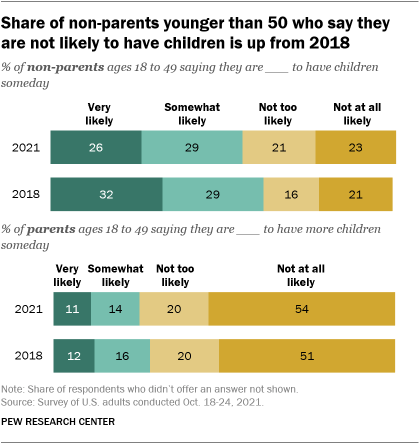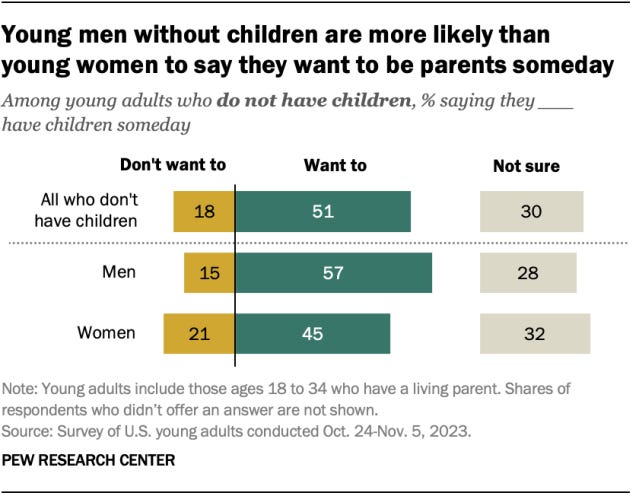Why So Many Women Are Opting Out of Motherhood
The economic and social costs continue to get higher for women in the US
Hey friends, hope your year is off to a good start - which probably requires taking regular breaks from the news cycle.
Today I give you an essay on the decline of fertility in the US. When I write pieces that really drive home the negative aspects of our care system, I have to remind myself that if we don’t talk about the hard stuff, it won’t change! As always, I’d love to hear your thoughts.
I have three children that I adore and can’t imagine life without. Yet, I can completely understand ambivalence to having children, especially now. In my 20s I was very unsure about having kids at all, even though, in retrospect I was blissfully unaware of the reasons and extent to which it’s so hard. Now I’m thankful for my naivety, because turns out kids can add a pretty amazing dimension to life. However, there are very real tradeoffs in the context of late stage capitalism.
Every time I travel abroad I’m reminded of just how much harder it is to be a parent in the United States of America. We work more, have less help from the government and the community, and place impossible expectations on parents - especially moms. Many of my colleagues in Latin America have spent time living in the US, and have told me that, while it was great for a bit before settling down, it’s not a place they’d want to call home and raise a family. Their disbelief when I share our lack of support underpins a broader trend: Americans are increasingly opting out of parenthood altogether, with the data showing a clear decline in both birth rates and desire to have children. While more than half of American men still say they want children, less than half of women say that they do not want children or are unsure.
There are many reasons why people increasingly choose not to have children, many of which apply to all higher income nations. Fertility and GDP per capita have been negatively correlated for a long time. One theory is that as people get richer, they invest more in “quality” for their children (expensive education, etc) but have a smaller quantity of children. The other theory is that as people (and especially women) are more educated and earn more, the opportunity cost of spending time raising children becomes higher. It kind of makes sense, until you realize that by “opportunity cost” we’re assuming that the only thing of real value is money.
In the US, we’ve come to an extreme, in that it’s not only a perceived opportunity cost, but the actual cost of childcare may be even greater than parents’ earnings, or impossible to find. It’s not about being able to send your kids to fancy schools, or wanting to spend more time making money, it’s about simply having enough care for them so you can work to support a family, period.
Unlike just about every other high income country, the US doesn’t provide paid parental leave, or subsidized child care, yet most families must rely on dual-incomes to get by and afford to raise children. For example, home prices where I live in Seattle have increased three and a half times faster than incomes since 1970, yet many families with children now spend even more on childcare than their mortgage. The median salary here is just over $76k, but a family of four needs well over six figures just to “get by.”
Then in workplace, women face an impossible bind: those without children often feel they are expected to work longer hours and take on extra projects because they 'must have free time,' while mothers face well-documented penalties in pay and promotion opportunities. Rather than addressing these systemic failures, our work culture manages to devalue women's time regardless of their parental status, perpetuating a cycle where women feel unsupported whether they choose motherhood or not, and even pitted against each other.
Women who are considering motherhood know that they are usually the primary caregivers, the default stay-home parent, are paid less to begin with, and do a disproportionate amount of household labor. Given this context, it is no surprise that choosing motherhood feels not just hard, but daunting, or even impossible.
As you may have heard, parenting in the US is so taxing that the Surgeon General recently deemed it a health hazard. When paired with his earlier warning about an Epidemic of Loneliness, these health warnings bring to the surface the non-economic problems with caregiving in our culture of extreme individualism: a detrimental lack of community and social support systems. It’s safe to say that people are not choosing less or no children because of too-stringent carseat safety regulations.
Unfortunately, the same elected officials that tout the “traditional family” ideal also refuse to address the problems that are fueling its decline. Comments about “cat ladies” and mental instability made by the incoming US administration exhibit not only misogyny and heartlessness, but a clear tension in America between the “traditional family” ideal pushed by conservatives, and the reality that more and more people are explicitly opting out of that arrangement. On the one hand, we have the trad wives of instagram fame, and on the other, an uptick in the 4B Movement. What happened to care being integrated into our lives and systems, a symbiotic part of the whole that coexists and doesn’t simply represent a choice of all or nothing?
And what are some ways we could create systems change in the realm of parenting, rather than placing unrealistic pressure on individuals? Here are the most obvious to me:
Make it clear that care is valued, and make it possible, with concrete policy changes: guaranteed paid parental leave, subsidized childcare, and affordable healthcare.
Flexible and remote workplaces with family-friendly policies and culture, including active work to dismantle discriminatory hiring practices and accommodations for new mothers and parents.
Community support including more family-friendly public spaces, affordable housing, and investment in quality public education, with schedules that match the workday.
In our communities, we can shift our own mindset away from scarcity, toward a gift economy / abundance mindset. Create our own care enclaves in our communities that are based on the benefit of the whole, not the individual. I just finished reading The Serviceberry and plan to write more about this one!
“What we crave is not trickle-down, faceless profits, but reciprocal, face-to-face relationships, which are naturally abundant but made scarce by the anonymity of large-scale economics. We have the power to change that, to develop the local, reciprocal economies that serve community rather than undermine it.” - Robin Wall Kimmerer
Don’t get me wrong: there are many valid reasons people don’t have children, and there should be no judgement either way. There are so many ways to care and be cared for, and to have age diverse relationships in your life. Nor am I making any kind of argument to incentivize higher birth rates, particularly in the context of climate change and natural disaster. When it comes to care, though, it is true that declining birth rates are going to have an impact on already-strained elder care systems, social security, and the economy in the US and elsewhere, which, much like ever-increasing natural disasters, we are woefully unprepared for.
Ultimately, a society that doesn’t value care is not going to generate a population of people who are eager to take it on - as parents or otherwise. I think most of all, feeling like you must make the choice not to parent simply because our society makes it so difficult, means missed opportunities for the joy, growth and satisfaction of a fundamentally beautiful aspect of the human experience.
Thanks for reading, please share your thoughts if you feel inclined. My heart goes out to LA, our friends and family there and everyone affected by the fires, it’s unbelievable. Mutual Aid LA has compiled a list of resources for those impacted. If you’re looking to help, here is a list of places to donate. ❤️








This is an unpopular opinion, I think we did this devaluing of care thing to ourselves. We insisted that outside work was more valuable, and attractive than care which is very internal and unseen.
I see this in myself.
AND, we also missed that no matter how much day care, elder care, after school care, and all sundry things, we cannot outsource care. Again, I'm seeing this for myself as I care for my parents.
AND, there's no dollar amount that we can put on care.
Care takes something that we have very little of these days because we traded it for money. Care take time and presence.
We have a care deficit because we do not have the time, and more importantly, we do not have the internal resources to be present. We are malnourished in this area.
For me the fix is decentering money making, even as I strive to make more money so I won't have to worry about making money. I recognize that the circular logic is lunacy, but I don't know any other way.
Ah, yes, all of this. I have one kid, which felt like the number I could faithfully attend to and still have a life. I never succeeded in breaking the “default parent” mode, despite many explicit conversations.